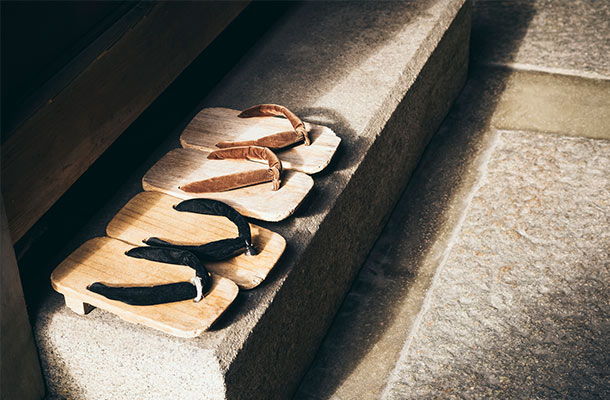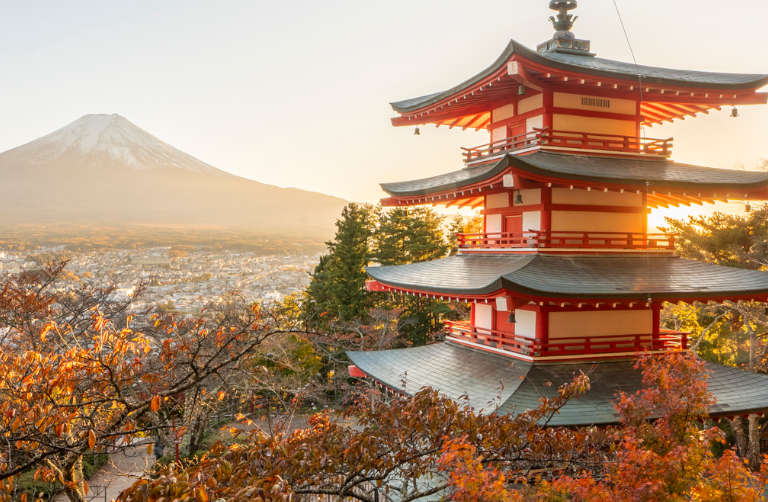Japanese Etiquette Tips: 8 Dos and Don'ts for Travelers
Part of being a good traveler is understanding the customs and social rules that make up a culture. Avoid causing offense by learning these 8 behaviors that are considered rude in Japan.
 Photo © iStock
Photo © iStock
In Japan, many everyday events are governed by strict rules of etiquette that are often unspoken and easy for foreigners to get wrong. Here are some tips on Japanese manners and social norms, to prevent you from embarrassment or causing offense.
- Japanese onsen etiquette
- Removing your shoes
- Blowing your nose in public
- Train etiquette
- How to behave on the streets of Japan
- Chopsticks and other dining etiquette
- Respect local customs
- Don't express anger or excessive emotion
- Righting a faux pas
1. Japanese onsen etiquette
If you have tattoos, cover them with a bandage or you might be turned away from entering an onsen. Many onsen do not tolerate tattoos because they suggest gang associations.
Make sure to shower and remove all clothing before entering the main onsen. Even though your hair is clean from showering before entering the actual onsen, never let it touch the water. If you have long hair, do as the locals do – use a small towel to wrap it up into a bun.
2. Don't wear shoes indoors
This is the most common mistake. There’s a reason the entrance of each house has a spot for your shoes. Some restaurants, shops, or galleries might ask you to remove your shoes before entering, so make sure you're wearing matching socks, and that they have no holes.
Toilets are generally regarded as unclean areas, so many homes, restaurants, and even some public toilets have slippers lined up at their entrances. Just make sure you use these when you’re inside the toilet area only. Toilet slippers are an object of extreme disgust in Japan.
If you make the mistake of going into a bathroom without toilet slippers on, be prepared for a banshee squeal that can break glass. Expect one with double the ferocity if you wear these slippers back out onto the tatami mat.
3. Blowing your nose is rude
Believe it or not, sniffling is preferred over blowing your nose in public. If you have to blow your nose, find a private spot, like inside a bathroom. It goes without saying, hold onto your tissues until you find a bin.
4. Train etiquette in Japan
Never barge your way onto the train. Platforms have markings that show where to form orderly queues while you wait and always let others disembark before you get on.
Once you’re on board, try to keep noise to a minimum. Loud chatter or behavior is usually frowned upon because it invades others’ space. Avoid talking on the phone (put it on silent) and send messages instead.
Eating and drinking should only be done on long-distance trains.
There are also designated seats for the elderly, injured, pregnant women, and those with young children – don’t be rude and sit in them if there’s someone who obviously fit one of these categories. Some commuter trains also have cars designated for women only. Male travelers should take care not to board those cars.
5. How to behave on the streets of Japan
Japanese cities are often crowded, so consideration is important and expected. Don’t stand in the middle of streets or entrances or block them with your luggage.
Traffic on sidewalks, as on the roads, tends to keep to the left. Stay left to avoid bumping into other pedestrians.
Do not show public displays of affection. If you do, you will receive discouraging looks, especially from older Japanese people.
You might be in a rush, but don’t eat while standing or walking on the street. Sitting while eating shows you have an appreciation for the food.
Smoking on the street is illegal. Instead, find a clearly marked smoking area to light up.
Streets and sidewalks in Japan are very clean, but as many a visitor has noticed, public trash cans can be hard to find. It’s expected that you will carry any trash with you until you are back home or until you find a bin.
6. Chopsticks and other rules at the dinner table
Never use your own chopsticks to grab food from a communal dish, unless you have the okay from everyone on the table. Use the cutlery provided or a pair of communal chopsticks instead. If none of those are available, one workaround is to use the non-pointed ends to tuck in, or to serve others.
Passing food from one pair of chopsticks to another or sticking them upright inside the bowls are big no-no. This is reserved for funeral rites.
Don’t point with your chopsticks, use them to spear food, or wave them around.
It’s polite to serve others before serving yourself. When eating from a small bowl, pick up the bowl and hold it close to your mouth while you eat, but leave larger bowls and platters on the table.
Do not waste soy sauce or pour it over cooked rice. If eating sushi, there's no need to add wasabi to your dish of soy sauce, as the sushi will already contain enough to enhance the flavor. Pieces of sushi should be eaten in one bite.
7. Respect local customs
Though extremely modern and technologically advanced, Japanese society also places a lot of importance on traditions.
When visiting temples and shrines, behave calmly and with respect.
Before visiting, wash your hands at the purification fountain outside the shrine, using the ladle provided. Many visitors then use the water in their cupped hand to rinse their mouths. This is optional, but if you choose to follow this step, do not drink directly from the ladle. Spit the water on the ground next to the station or pour the water from your hands onto the ground – don’t return it to the fountain.
Photography is prohibited inside some shrines and temples – be sure to look for signs.
8. Don't express anger or excessive emotion
The Japanese disposition is composed and collected – even if there might be a tumult of emotions bubbling under the surface. Maintaining an even demeanor and preserving harmony is an important factor in Japanese society, so if you are frustrated, it’s the Japanese way to keep it locked away to deal with in private.
Shouting, screaming, raising your voice – it's just not the done thing in Japan, and people who do are considered uncouth or immature.
Righting a faux pas
Despite these tips, you’re bound to commit one or more of these if it’s your first (or even fifth) visit to Japan.
Fortunately, most Japanese locals are very generous and will kindly point you in the right direction. A quick bow, a genuine “Sumimasen” (sorry), and following correct etiquette will soon put you on the right path again.
Related articles
Simple and flexible travel insurance
You can buy at home or while traveling, and claim online from anywhere in the world. With 150+ adventure activities covered and 24/7 emergency assistance.
Get a quote

3 Comments
What exactly is a Faux pas?
Faux pas means "false step" in French. In this context, it means to make a social blunder.
I was born in England but i now live in Japan. I was with my boyfriend at the time (who i had been dating for a year) and we were sitting on my living room couch. We were in a very serious relationship. He initiated a french kiss, and i grabbed his butt. He seemed horrified and immediatly broke up with me. I know this might be innapropriate but no one will tell me and i need to know. What did I do wrong?